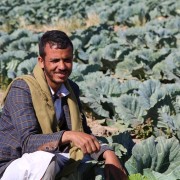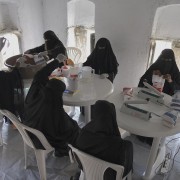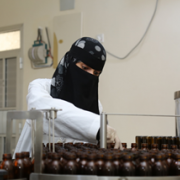Speeches Shim
The U.S. Agency for International Development (USAID) today announced the award of a $27.4 million activity to support Yemen’s economic recovery.

USAID is strengthening the Central Bank of Yemen and the Ministry of Finance to stabilize and create a productive macroeconomic environment given the ongoing conflict. USAID provides financial and marketing advice to Yemeni small and medium enterprises, primarily in the fishery and agriculture sectors, that generate the value needed to create jobs, increase incomes, and support sustainable livelihoods.

In the small seaside village of Mayfa, in Yemen’s Hadramawt Governorate, the whir of a salt grinding machine serves as the backdrop for the regular motions of six women gathered along a simple assembly line. Sitting in pairs around three plastic tables, they fill, measure, and seal small plastic bags of refined sea salt destined to be featured in the spice aisles of the region’s grocery stores, providing livelihoods for hundreds of local families.

Fishing was once the most productive sector in Yemen’s economy, contributing 15 percent of gross domestic product (GDP). Still today, it holds the promise of being a major source of foreign exchange earnings and fiscal revenues. Moreover, for coastal Yemenis, the fisheries sector remains the main form of livelihood, and a primary source of hope for lifting people out of poverty and food insecurity. With the war, however, poor handling and preservation practices have depleted the market and nutritional value of Yemen’s fishing stocks. In response, the USAID Yemen Economic Stabilization and Success (YESS) project has delivered targeted training and technical assistance to fishermen, and all along the value chain, to revitalize the quality of fish catches and maximize returns.

In the wake of the COVID-19 crisis in Yemen, the Umm Al Banat Art Center for Women’s Training faced a serious dilemma—adapt or go out of business. The center is a women-led social enterprise located in Khore Makser, Aden that previously specialized in manufacturing clothing. With the arrival of the coronavirus pandemic, however, demand for its products sank and sales plummeted. At the same time, demand for personal protective equipment (PPE) and hospital-grade clothing took off rapidly, offering Umm Al Banat an opportunity to realign its production and re-launch itself as a profitable business.


Comment
Make a general inquiry or suggest an improvement.